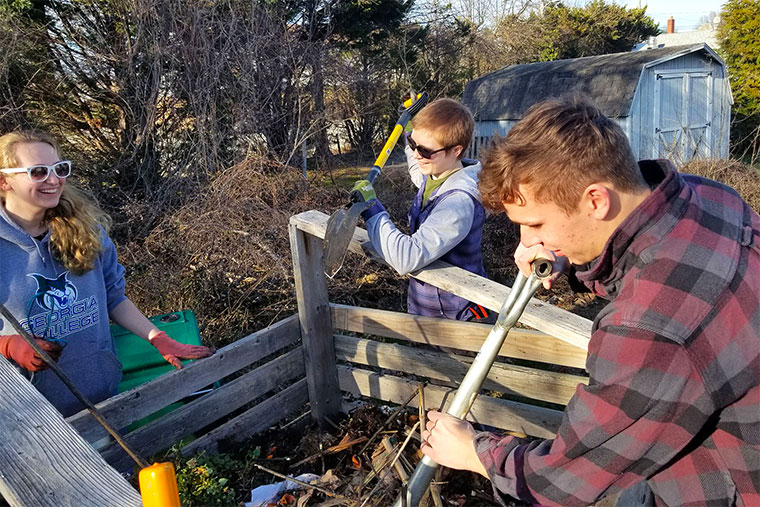Building the Soil Food Web
February 24, 2020The Food Initiative is leading the expansion of Washington College's zero waste initiatives with the launch of a student Compost Team.
Because nutrient density starts and ends with the soil, the Food Initiative has begun to orchestrate a team of students dedicated to institutionalizing this ecologically sensible and time honored tradition on campus.
As a starting place, students use permaculture methods that accelerate natural processes to create finished compost in 18 days at the campus garden. Their method, which they plan to teach in workshops for local community members, can be easily replicated in backyards to reduce household organic waste.
 The Compost Team prepares a batch of popcorn with healthy fats for an educational
movie night.The students began this semester by constructing a micro-bin to test the recipe composition
for efficient composting in an aerated static pile, in which a small fan blows oxygen
into a pile to hasten its decomposition into finished compost. While it requires more
infrastructure, the method can accommodate a large volume of food scraps and conceivably
offset some of the organic waste from the Dining Hall.
The Compost Team prepares a batch of popcorn with healthy fats for an educational
movie night.The students began this semester by constructing a micro-bin to test the recipe composition
for efficient composting in an aerated static pile, in which a small fan blows oxygen
into a pile to hasten its decomposition into finished compost. While it requires more
infrastructure, the method can accommodate a large volume of food scraps and conceivably
offset some of the organic waste from the Dining Hall.
They're also promoting vermicomposting among around campus. They're planning field trips to learn about composting systems at other schools, and are working to establish more educational demonstration examples of soil-building techniques in the campus garden.
 A screening of Dirt! The Movie builds excitement about the importance of composting.
A screening of Dirt! The Movie builds excitement about the importance of composting.
Beyond building awareness of the importance of organics recycling, the Compost Team is working to increase the ease with which anyone on campus can participate in the Zero Waste effort. The big project this semester is improving access to the organics collection site near the Western Shore dorms on campus, which involves regrading a hillside, taking out a fence, and constructing a railing for easy deposit of food scraps.
Students representing diverse majors are involved in the effort, and have an eye toward becoming self-sufficient in operational costs in 5 years, helping to strengthen environmental and financial stewardship of the college. To learn more about the composting effort, contact Shane Brill.
